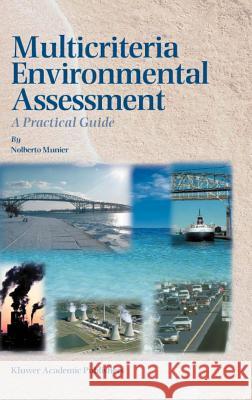Multicriteria Environmental Assessment: A Practical Guide » książka
Multicriteria Environmental Assessment: A Practical Guide
ISBN-13: 9781402020889 / Angielski / Twarda / 2004 / 311 str.
Multicriteria Environmental Assessment: A Practical Guide
ISBN-13: 9781402020889 / Angielski / Twarda / 2004 / 311 str.
(netto: 575,06 VAT: 5%)
Najniższa cena z 30 dni: 578,30
ok. 16-18 dni roboczych.
Darmowa dostawa!
The purpose of this book is to analyze, with actual examples, different techniques that have been developed to tackle the complex task of making an Environmental Impact Assessment (EIA) of a project. A project may influence the lives of many people, can change the physical environment temporarily or forever, and creates benefits or losses, not only for the people who promoted it, but also for those not related whatsoever with the project. Thus, its assessment is not only a commercial evaluation of gains and losses, but it goes far beyond that, for it also has to appraise: -how people's way of life will be affected; -how significant the alteration produced in the social fabric will be; -what the result will be of using certain renewable and non-renewable resources; -how much the expected economic development will cost in terms of loss of resources sustainability; -how to measure what is not easily measurable: enjoying a sunset, a stroll in a tropical forest, climbing a mountain, etc.; and -how to integrate the technical and environmental aspects of projects with the desires, wishes and needs of the population. Even though, in many cases, the different techniques can be used standalone, this procedure appears to be unsatisfactory, because none of them can give a complete answer to our problem. For that reason this book explains each technique separately, but whenever possible, and through examples, links them in order to obtain the maximum benefit from each one.
This book is subtitled A Practical Guide, precisely because it tries to guide the practitioner in this labyrinth of techniques, by suggesting the best tools to use in each case, complementing this with abundant Internet references that provide a fast way to get more information about specific concepts, and facilitating the examination of actual EIA in many different fields.
Audience: This book will help the practitioner, the student, and the public in general on how best to understand and evaluate the effects of new projects on our environment. Worksheets to prepare an EIA are included.











